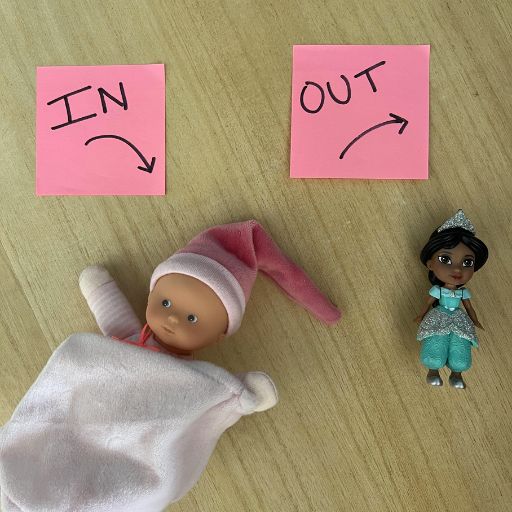How to Stop Grandparents Buying Too Many Gifts (2025)
Hello, hello! Welcome back to Financial Self-Care, the place where you learn how to take care of yourself by taking care of your money. And today, I’m taking a risk and talking about something that’s a little controversial: Grandparents buying too many toys.
You can listen to Financial Self-Care on Apple, Spotify, or wherever you like to listen!
Actually, let me re-phrase that. It’s not controversial for moms, at least not in my sphere.
Almost every mom I’ve talked to – from my mommy and me classes to swimming lessons – has had the frustrating experience of relatives buying too many toys for their kids.
You’ve probably experienced this…
Your parents are on their way to your house. The kids are super excited, waiting at the window.
They pull into the driveway. You hear, “Yay, grandma and grandpa are here!” Then, shrieks of delight as the grandparents walk up to the front door, arms full of gifts.
You’re immediately annoyed. “More gifts? Again?”
I get it. The grandparents are buying too many gifts, and it’s incredibly frustrating. Sometimes the problem goes beyond annoyance and frustration, and it can be downright stress-inducing.
Grandparents Buying Too Many Gifts: The Mental Load
You start walking a very fine line between wanting to be grateful and knowing that as soon as the grandparents leave, the kids don’t care about the toys and it’s your responsibility to clean it all up.
The main reason moms are overwhelmed and frustrated by excessive gift-giving can be boiled down to this: THE MENTAL LOAD
The mental load has become a buzzword in recent years, but for those of you living under a rock, I’ll explain.
UCLA Health refers to the mental load as, “the behind-the-scenes, cognitive and emotional work needed to manage a household.”
The invisible labor of the mental load is unpaid, unrecognized, and includes unregulated tasks like:
- Scheduling appointments,
- Finding the best pediatricians and dentists (and let’s be real – doctors for your husband)
- Making the grocery list. (Who do you think knows when the house is almost out of goldfish?)
- Paying bills
- Organizing events or playdates
- Arranging childcare
- Buying kids’ friends birthday presents and RSVPing to the party
- Bringing snack to preschool
- And more
It’s unsurprising that women and moms bear most of the invisible labor of the household. Eve Rodesky, famous for her work in household equity, tells her story in an article with LemonStripes:
“Eve, a mother of 3 and a Harvard-educated lawyer, was on her way home from a business trip when her husband texted her that a drunk man had left a bottle and his jacket in their front lawn. She thought it was amusing but when she got home from her trip that night, the jacket and bottle were still there. When she walked inside, her husband was watching TV and had spent his evening working out after the kids went to bed. So she went outside and cleaned it up herself, timing how long it took her to do so: 12 minutes.
During those 12-minutes, she had a realization. She said:
“The last 12 minutes of my day were in the service of our household, whereas his last four hours were in service of him,” she said. “I came to the conclusion that men, women, and society view men’s time as finite and women’s as infinite.”

Why Grandparents Buy Too Many Gifts
There are many reasons why grandparents buy too many gifts. Here are a few of those reasons:
1. They want to give what they didn’t have
Many Baby Boomers grew up without having a lot of extra stuff. They had their basic needs met and didn’t get much beyond that.
It’s possible their family didn’t have much money. And were told “We can’t afford that” to things like toys, new clothes, or fancy accessories.
They would have dreamed about their grandparents showing up to their house with a truckload of gifts. And so, because that was their dream, they do it for their grandkids.
It’s how they show love
If you’re unfamiliar with Gary Chapman’s The 5 Love Languages, here’s a little breakdown. People receive love in one of five ways: Words of Affirmation, Physical Touch, Acts of Service, Quality Time, and Receiving Gifts.
Often, how people receive love is also how they give love.
If receiving gifts is how a grandparent feels loved, then they might assume that other people receive love in that same way. Hence, grandparents buying too many gifts.
They’re co-dependent
If a person is co-dependent is means they rely upon family members to feel worthy, recognized, and ensure they won’t be abandoned. They get their sense of self from pleasing others.
A co-dependent grandparent buying too many gifts happens because they’re receiving praise and attention, which in-turn gives them a boost of self-esteem.
This is a really hard concept to address because it’s often rooted in trauma experienced by the grandparent. And the grandparent often lacks awareness on their co-dependency.

6 Ways to Stop Grandparents Buying Too Many Gifts
Here are 6 of the best ways to stop grandparents from buying too many gifts:
1. Gain Clarity
You first need to understand why you dislike grandparents buying too many gifts. Get really honest with yourself. Sometimes the answer is something we don’t want to own up to.
Here are a few uncomfortable reasons you might dislike grandparents buying too many gifts:
- You’re jealous that you can’t afford to buy your kids lots of gifts.
- Clutter makes you anxious.
- You want the grandparents to give time, not material items.
- Your parents rarely bought gifts for you as a child.
- You feel like your kids are being treated differently (or better) by your parents than you were treated when you were a kid
If any of these are true for you, no judgment here. Believe me. But it’s helpful to acknowledge and own your why.
2. Set Boundaries
Next up, it’s time to set some boundaries. Here are some ways to set boundaries with grandparents buying too many gifts:
- Make your expectations clear
- Express gratitude
- Be direct and concise
- Be kind
Some grandparents are really receptive to your asks and others… well, not so much. And let’s face it: Older people can be stubborn.
It’s possible you’ve tried to set clear boundaries, and those boundaries still aren’t respected. After all, grandparents do have autonomy.
In the event that grandparents won’t respect or adhere to your limits, you can do two things:
1. Pick your battles.
You may detest an abundance of extra toys coming through the door all the time, but ask yourself: Is this battle worth fighting?
2. Set limits with your kiddos.
In our house, we are at toy capacity. This means, any time a new toy comes in to our house, an old toy needs to be re-homed. I thought this was going to be tough to implement, but our kids were really receptive to it.

3. Explain Research Findings
The research is very clear on this: Kids do better with less toys. One study found that the average American home has 139 visible toys, available to children in their home.
And yet, kids often report feeling overwhelmed by having more than 16 toys at their fingertips.
Having more than 12 toys for a toddler leads to a shortened attention span and less creative play.
I don’t know about you, but the grandparents in our life aren’t Googling questions about what’s best for kids in 2023. And we shouldn’t expect them to.
But, in order for grandparents to stop buying too many gifts, we must share the research findings with them. This is what you can do:
- Explain that you’ve learned something new about over-consumption.
- Talk about the article you read.
- Tell grandparents that you’re trying out an experiment for yourself. You’ll be hiding a majority of toys in the garage for a week.
- Politely explain that, in addition, there will be no more toys added to the kids repertoire.
- Ask that they respect this new system. At least until you report back with your findings.
You might be surprised (and relieved) to know that grandparents want what’s best for their grandkids. They just need a little education, too!

4. Open a 529 College Savings Plan
A 529 college savings plan is an amazing tool that can help set your kids up for a better financial future.
This is also another way that grandparents can give to their grandkids without buying too many gifts that kids don’t need.
Pros of 529 college savings plan:
- There are long-term rewards
- It doesn’t add to the clutter
- Any contribution is very generous
- Starting early will give the kids an even better shot at paying for education expenses.
- The new bill now allows unused 529 funds to be rolled into a Roth IRA. Meaning, there’s less of a chance to “over-contribute” even if a child opts out of post-secondary education.
Cons of a 529 college savings plan:
- It doesn’t give a grandparent the excited response that kids have toward receiving gifts.
- Some grandparents don’t believe it’s their “job” to pay for grandkids’ schooling.
The truth is, some grandparents love the idea of setting a grandchild up for financial success later in life. Others, want to be the “fun” grandparent and give gifts now.
Neither is wrong and both can be helpful. But this might be a healthy alternative to buying too many gifts.
5. Suggest Experiences
We live in a culture where it’s easy to get wrapped up (pun very much intended) in the “stuff.” We think we need more, more, more.
The truth is, kids do want more – more time.
A great alternative to grandparents buying too many gifts is spending more time with grandkids. As the parent, you can suggest grandparents spend time on meaningful experiences with your kids.
Meaningful experiences for grandparents and grandkids:
- The local library
- A park or playground
- The zoo or aquarium
- Ice cream shop
- Back-to-school shopping

6. Communicate What the Kids Need (Not Want)
Sometimes grandparents buy too many gifts because they have no idea what kids actually need. So they just buy everything.
You can communicate what the kids need with a simple text saying, “Hey, I know you love giving Sally gifts. She really could use a (fill in the blank). It would feel special if it came from you!”
Some ideas might be:
- Books
- Sporting Gear
- Clothes
- Shoes
- Lunch Box or Backpack
- Season Passes (to the zoo, museums, botanical gardens, etc.)
Grandparents Buying Too Many Gifts: Q&A
Here are the answers to your commonly asked questions:
What is grandparent gift-giving etiquette?
To the grandparents who like to buy big, bright, obnoxious toys: PLEASE, STOP.
Part of grandparent gift-giving etiquette is to be respectful of the entire household (and their ears).
Yes, giving gifts is generous and courteous. So long as the gifts are within reason.
Keep an open line of communication about the types of toys you are gifting. And keep in mind that there are a bunch of great ways to show grandkids love!
Why do grandparents treat grandchildren differently?
The role of a parent and grandparent are different. And therefore, grandparents will treat their grandchildren differently than how they parented you and your siblings.
It can be confusing, even bewildering, at first. You might remember your dad being the big tough guy that everyone was semi-scared of. Yet, with his grandchildren, he’s softer and more engaged.
Again, this can bring up some uncomfortable feelings for you. And that’s okay.
If you’re feeling confused, surprised, annoyed, envious, or otherwise about the fact that your parents are treating your children differently than they treated you, acknowledge the feeling.
This also might be a good time to explore the option of speaking with a professional.
What are signs of a toxic grandparent?
The biggest red flag and sign of a toxic grandparent is displaying signs of co-dependency.
Like we briefly touched on above, a grandparent that is co-dependent relies on others to feel a sense of worthiness. This toxic trait can put a lot of pressure on grandkids.
Signs of a toxic grandparent:
- They’re manipulative
- They don’t respect parents’ rules and boundaries
- Confronting them feels impossibly challenging
- They guilt-trip grandkids
If you have a toxic grandparent in your life, it’s time to re-evaluate the relationship. Again, consider seeking help from a professional.
The Wrap Up: Stop Grandparents Buying Too Many Gifts
In the United States, we are especially susceptible to having too much stuff. This can be, in part, due to grandparents giving too many gifts.
Understand why you want grandparents to stop giving so many gifts and be really clear in your gift-giving expectations. Offer alternatives such as contributing to a 529 college savings plan or sharing experiences together.
Behavior change, like grandparents buying too many gifts, is not easily changed. Show compassion, kindness, and gratitude through the process!
Read next: Financial Literacy for Kids: How to Teach Kids about Money
